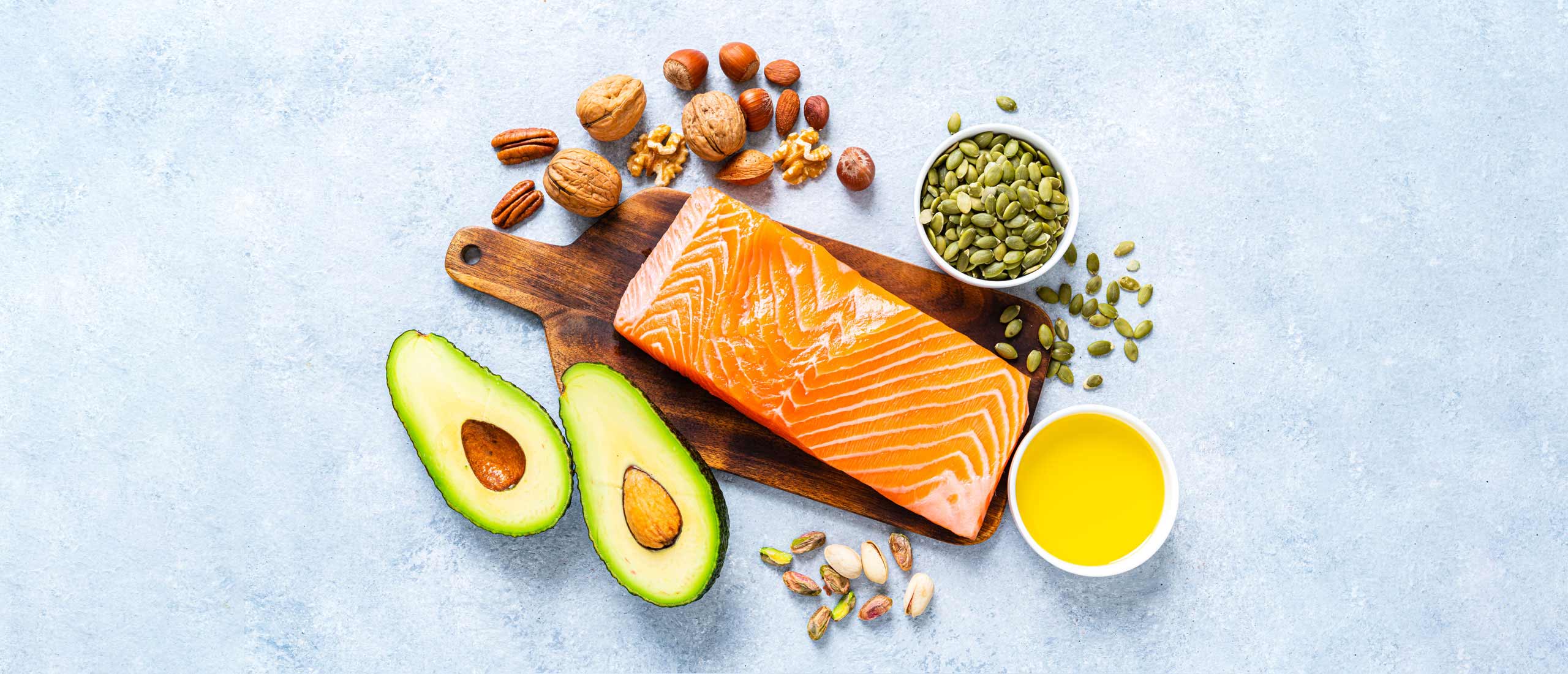Fast Facts
- The keto diet concept is simple: eat more fat to lose fat.
- Some recent research suggests a low-calorie ketogenic diet may not only be effective for weight loss but may also help improve hormone levels.
- A recent study found that eating a low-calorie, low-carb keto diet also may show promise for treating hypogonadism.
It’s been a few years since the keto diet exploded, prompting rave reviews about the effectiveness of this high-fat, ultra-low-carb phenomenon.
Like most of us, you probably half expected it to fade away. But years later, it continues to boom. In 2020, “the keto diet” was reported to be the most searched diet trend on Google, and, according to Grand View Research, by 2027, global ketogenic diet market size is predicted to reach 14.75 billion.
So what’s the big draw? The concept is simple: eat more fat to lose fat. And loads of science backs it up.
If you’re thinking, “But is it right for me?” or, “What are the hormonal implications of a keto diet for men?” Then you might be surprised to learn that some recent research suggests a low-calorie ketogenic diet may not only be effective for weight loss, but may also help improve hormone levels (1)—including boosting low testosterone (low T).
What Is the Keto Diet?
The first iteration of the ketogenic diet came about just over 100 years ago, but it wasn’t until 1921 that the term “ketogenic diet” was coined by an M.D. at the Mayo Clinic (2). The basic principles (restricting carbs and consuming more fat) were used to treat seizures in people with epilepsy. Other benefits now linked to the diet, namely weight loss, but also some evidence for reduction of inflammation and disease prevention were not reported then.
In the ’70s, the concept made a comeback in the form of the Atkins Diet. The idea was the same—low-carb, high-fat—but the two diets had one notable difference: while the keto diet maintains a low-carb protocol indefinitely, the Atkins Diet (the original is known today as Atkins 20) consists of four phases, gradually increasing carb intake over time.
Other researchers tinkered with ways to use ketosis as a magic weight-loss tool after Atkins helped pave the way, but it wasn’t until decades later that keto research (3) into areas beyond weight loss began in earnest. We are now beginning to assemble some evidence to link the diet with lower inflammation, reduced risk of many chronic health issues (such as diabetes and cancer) (4), boosted energy and brain health—and most recently—helping overweight and obese men drop fat and boost low T.
So, just how high in fat and low carb are we talking? According to functional medicine expert Will Cole, IFMCP, DNM, DC, and author of Ketotarian, the most common keto macronutrient breakdown is 75/20/5 (fat, protein, carbohydrates).
But ratios as high in fat as 80/15/5 have been used in the past to help treat children (5) with epilepsy. Macro needs for healthy adults will vary based on an individual’s body composition and genes.
Related: This All-Meat Eating Plan Sounds Too Good To Be True, Because It Is.
How Does the Keto Diet Work?
A ketogenic diet focuses on eating a macronutrient ratio high in fats, moderate in protein, and low in carbohydrates in order to put—and keep—your body in a metabolic state called ketosis, where you burn fat as your main source for fuel.
Our bodies normally burn carbohydrates for energy. Carbs are converted into glucose, a simple sugar that serves as a major fuel source for our cells and metabolic functions through a complex process called glycolysis. During glycolysis (6), glucose is split into smaller molecules (called pyruvate) for use as energy throughout the body. Our bodies can also create glucose from non-carbohydrate sources in a process called gluconeogenesis.
Glucose is the body’s first choice for fuel. When you limit the number of carbs that you eat, the body taps its stores of ketones for fuel, which are molecules created by the liver from fat when blood insulin is low. Think of it like a hybrid car, which runs on electricity when the gas tank is empty. “Because glucose is your body’s first choice for fuel, limiting your carbohydrate intake and enhancing how much fat you eat, your body will be able to stop utilizing sugar for fuel and turn to fat instead,” explains Cole. Getting into ketosis usually takes about three days to induce if you eat fewer than 50 grams of carbs a day (7).
Some studies suggest that being in ketosis may help support healthy inflammation levels, enhance cognitive function, boost energy, and stabilize blood sugar—all of which may contribute to why the diet has been shown to promote weight loss. And while the diet is equally beneficial for both men and women, there are some new findings that make a very good case for the keto diet for men.
Benefits of the Keto Diet for Men
“Men, specifically, can benefit from the keto diet for its ability to help shred pounds while also building muscle mass, which is appealing for a lot of men,” says Cole. But now, a recent study (8) shows that there also may be a connection between the diet, insulin action, and its ability to boost testosterone.
In the study, researchers followed 17 middle-aged men who were overweight or obese while they followed a low, 800-calorie-per-day keto diet. After a month, the men had shed significant amounts of weight and body fat, and increased their testosterone levels.
The average age of the group of men in the study was 41 years old. The mean body mass index (BMI) for the group was 36.4, a number that would indicate clinical obesity in an individual, and the total testosterone level average for the group was 2.5 nanograms per milliliter (ng/mL), which is at the low end of what is considered normal for men. They had lower levels of sex hormone-binding globulin (SHBG), a protein that carries testosterone through the blood, at the beginning of the study.
The men followed a keto diet for four weeks, consuming no more than 800 calories per day. At the end of the study period, the group experienced an average increase of 0.89 ng/ML in total testosterone. The cohort’s average weight loss was 9.3 kilograms (20.5 pounds) and its BMI average was reduced by 3.1 points.
The study didn’t assess whether the men had any increases in sexual function or libido after following a keto diet, or whether they had reductions in any other symptoms associated with low T.
How Keto Might Increase Testosterone and Reduce Weight
The ultra low-carb nature of the keto diet in men accomplishes two significant outcomes at once. “Since a ketogenic diet helps to stabilize blood sugar and rebalance hormones—specifically insulin—it would make sense that a ketogenic diet could also help improve testosterone levels in men,” says Cole.
“Oftentimes, when you fix one hormonal imbalance, you end up fixing another inadvertently because your hormones signal to each other when one starts stabilizing properly. It helps others to follow suit.”
The Keto Diet May Also Treat Hypogonadism
Overweight men are more susceptible to low T, a condition often called hypogonadism (when sex glands produce little or no sex hormones). This puts further strain on the metabolic system, further altering the metabolic balance, and creating something of a vicious cycle.
A recent study found that eating a low-calorie, low-carb keto diet also may show promise for treating hypogonadism. The researchers followed 20 overweight or obese men with hypogonadism. They found that, after 12 weeks on the diet, the men shed a significant amount of weight, decreased BMI, and saw improved insulin sensitivity.
Other Keto Benefits
There is some evidence that men and women who adopt a keto diet may enjoy some additional benefits including reduced inflammation, stable blood sugar, and improved cognitive support.
A few recent studies have suggested that keto may have the potential to improve learning, memory, focus, mood, and sleep. When it comes to brain function, some research suggests that a ketogenic diet may help to lessen the damage associated with Alzheimer’s Disease and may also have the potential to assist in its management.
It’s important to note that the keto diet followed in this study was not your typical keto protocol but instead a very low-calorie version of the keto diet (VLCKD, or very low calorie keto diet). On a VLCKD, you still follow the macronutrient ratio of high-fat, moderate-protein, and low-carbohydrates, but the total calories consumed in a day (800) is more restricted.
Related: Just Buy the Vitamix Already
What Are the Risks of the Keto Diet for Men?
One minor risk of trying the keto diet is the “keto flu”, a short-lived period wherein you may experience symptoms such as fatigue, headache, and other mild symptoms as your body transitions into ketosis, regardless of your weight or hormone levels. You can ease the symptoms of “keto flu” during this transition by reducing your exercise routine to moderate or less during the first five days, drinking about eight 8oz. glasses of water a day, and including sources of potassium and magnesium in your diet.
And the temptation of a “dirty keto” diet—i.e. one laden with processed meat and pre-packaged convenience foods containing unhealthy levels of sodium and additives—is a pitfall you’ll want to avoid. Cole recommends a cleaner, nutrient-dense approach like the one outlined in his book Ketotarian, which relies on plenty of low-starch, seasonal vegetables, eggs, seafood, and high-quality fats.
While the ketogenic diet is relatively safe for most people, even overweight men with low T, it’s still important to contact your doctor before making an extreme lifestyle adjustment as your physician can speak to your specific health case and make you aware of any possible side effects.
What Can You Eat on the Keto Diet?
- Organic, pasture-raised meats
- Wild-caught seafood
- Organic eggs
- Healthy fats (olive oils, coconut oil, avocado oils, organic butter, and ghee)
- Fatty fruits (avocado and coconut)
- Low-starch vegetables (leafy greens, onions, garlic, zucchini, cauliflower)
- Low-sugar berries
- Dark chocolate (80% or higher)
- Nuts, seeds, and unsweetened nut milks
- Organic, grass-fed, full-fat dairy (if you can tolerate)
- Spices and herbs (ginger, turmeric, fresh herbs)
- Fermented foods
- Bone broth
- Coffee and tea
- Stevia and monk fruit extract
- Pure spirits such as tequila, vodka, whiskey, or gin (in small quantities; avoid mixes with added sweeteners)
What Can’t You Eat?
- All grains (rice, pasta, breads, oatmeal, quinoa, etc.)
- High-starch vegetables (potatoes, corn, sweet potatoes, beets, carrots)
- High-sugar fruit (bananas, mangos, pineapples, oranges)
- Beans and legumes
- Soy products
- Cane sugar, coconut sugar, honey, pure maple syrup
- Refined oils such as vegetable, corn, or soy
- Most alcoholic beverages including beer and wine (particularly high-sugar wines) cocktails with added sugar or juices, mixed drinks
The Bottom Line
The keto diet has been around for more than 100 years and has significant research to back up its benefits in helping to achieve weight loss. Following an ultra-low-carb keto diet can also help men stabilize blood sugar and rebalance hormones—including boosting low testosterone. But with any diet or lifestyle change, there are some side effects, so be sure to consult your doctor to see if it’s the right choice for you.
References:
Wilson, Jacob M et al. “Effects of Ketogenic Dieting on Body Composition, Strength, Power, and Hormonal Profiles in Resistance Training Men.” Journal of strength and conditioning research vol. 34,12 (2020): 3463-3474. doi:10.1519/JSC.0000000000001935
“Johns Hopkins Medicine Celebrates Its Contributions to Keto Therapy as Diet Turns 100.” Johns Hopkins Medicine Newsroom, 15 July 2021, www.hopkinsmedicine.org/news/newsroom/news-releases/johns-hopkins-medicine-celebrates-its-contributions-to-keto-therapy-as-diet-turns-100.
Paoli, A et al. “Beyond weight loss: a review of the therapeutic uses of very-low-carbohydrate (ketogenic) diets.” European journal of clinical nutrition vol. 67,8 (2013): 789-96. doi:10.1038/ejcn.2013.116
Crosby, Lee et al. “Ketogenic Diets and Chronic Disease: Weighing the Benefits Against the Risks.” Frontiers in nutrition vol. 8 702802. 16 Jul. 2021, doi:10.3389/fnut.2021.702802
Rogovik, Alexander L, and Ran D Goldman. “Ketogenic diet for treatment of epilepsy.” Canadian family physician Medecin de famille canadien vol. 56,6 (2010): 540-2.
Chaudhry R, Varacallo M. Biochemistry, Glycolysis. [Updated 2021 Aug 17]. In: StatPearls [Internet]. Treasure Island (FL): StatPearls Publishing; 2022 Jan-. Available from: https://www.ncbi.nlm.nih.gov/books/NBK482303/
Harvey, Cliff J D C et al. “The use of nutritional supplements to induce ketosis and reduce symptoms associated with keto-induction: a narrative review.” PeerJ vol. 6 e4488. 16 Mar. 2018, doi:10.7717/peerj.4488
O’Neill, Mike. “Low-Calorie Ketogenic Diet Can Help Testosterone Levels in Overweight Men.” SciTechDaily, 24 May 2021, scitechdaily.com/low-calorie-ketogenic-diet-can-help-testosterone-levels-in-overweight-men.







